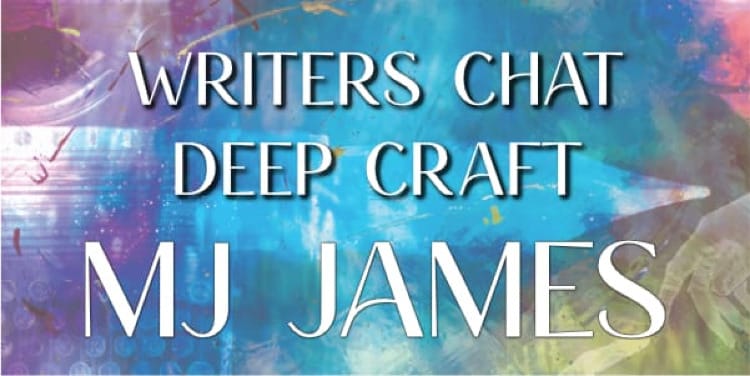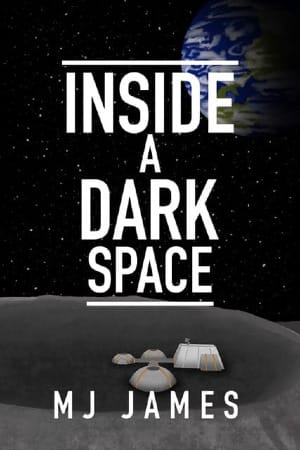Don't Let the F*ckers Win


I am pretty sure I could spot one of MJ James's books in the wild without any identifying information just by reading a few lines: sharp and clear as glass, deeply felt, disarming with its straightforwardness. James's characters navigate systems and worlds that are constructed to exclude them, but they persist– and find allies and connection in the least likely of places.
INSIDE A DARK SPACE is all of the above and more; it's both a warning of what may come and summoning for community in the here and now, and a reminder that in the worst of times, we will persist and we will care for each other through whatever means we can. I am not a crier, my friends, but this is the second time an MJ James book has made me put it down to weep over my tea, and I adore them for it.
LZ: I was thinking over the character's names and how beautifully apt they are, and how Finch's history with the names bestowed upon them was so crushingly revealing of how hatefully they'd been treated... and then realized also that your title is also perfect in this way as it reflects Finch's internal and external realities. How and when did you choose the character names and title? Did they come to you, or were you looking for specific effects?
MJJ: The title of the book came to me when I was thinking about the book, because of the double meaning - not just with Finch, but the trans community in general. I started this book right after our current president was elected. Project 2025 was out there for everyone to see … and no one seemed to care. I knew dark times were ahead and I wanted to show that in the title. But it also represents where the characters were physically - located in a crater that never saw sunlight. Now I see all the trans people that are going back into hiding for their own safety and the safety of their family and it fits there as well. As for Finch, they have several names in the story. Some we never learn, but I knew they would have a new name for this new life and Finch just worked. Then I decided that the commander would be the one to give it to them. I think this takes on even more significance as the trilogy continues.
LZ: Trying to get people to care about Project 2025 when they thought they weren't directly threatened often felt like shouting into the void. And there's no satisfaction or comfort in being right–just the resilience and hope we find in community.
MJJ: Yes! I feel like this so often. At times it is hard and I’ve had horrible things directed at me - sometimes out of ignorance and other times out of malice. But then you do find someone that connects and I remember why it is so important to tell my communities' stories. I see how the world has changed since I was a genderqueer kid in the 80/90s and how kids now have trans representation. How they grow up knowing they are autistic. I want them to know they aren’t alone. That they are brilliant exactly how they are. So yes, I would love people who aren’t directly affected (which is a population getting smaller by the day) but I do it for those who see themselves in my characters.
LZ: There are elements of that–especially the pieces of community Finch doesn't know they have–that are really beautifully portrayed in the book. They don't so much balance the struggle and trauma as they do make it survivable.
MJJ: Hearing that gives me joy, because that is what I was going for. I can’t deny that times are going to be tough - just this week the Supreme Court supported the T administrations transphobic campaign on gender markers on passports. They are making it next to impossible to leave the country - to find safety. But we have to keep going forward because it is survivable. Their biggest weapon is taking away our joy - but even in the darkness we can find joy.
LZ: Finch's trauma is relayed to us through splintered, fractured memories of their time on earth; we get snapshots of their history, and are more than able to fill in the missing pieces. It's concise and effective–and harrowing, especially given the trajectory of current events. It's a difficult balance to keep–the fear and pain and tragedy alongside the hope and perseverance and the ways that we find community and belonging even in the worst of times.
MJJ: This section sent me back to therapy. Most my reviews strongly suggest you read the trigger warnings and for good reason. I know I needed to write the worst case scenario-based on history and my own trauma-and make it out the other side. But the panic attacks made me realize that I couldn’t keep walking it alone. We need support networks, whether that is therapists that understand our community, or family (found or born) to stand by our sides. We can’t go through this alone.
LZ: The book's tone is quite straightforward, with both the hopeful and despairing elements directly and clearly addressed; this is something I find consistent in your voice across books and series and genres. I'm curious if you've made deliberate choices about tone or language or style to craft that, or if it developed on its own?
MJJ: I think it is a bit of both. My style has developed over the years. It has been strongly influenced by the bulk of non-fiction writing I did while I paused fiction writing to raise my kids. However, the messaging and the story is deliberate. Before I started writing my debut, In-Between, I decided who I wanted to be as an author. I knew I wanted to write autistic stories, stories that tell identities that are often ignored or poorly represented in literature, and I wanted to do it in a way that readers could connect. Before I start each project I also determine why I am writing that project. It is important that there are books for a variety of reasons, including enjoyment. I want people to enjoy my books, but I write them because there is something that I need to say. I write them so that people know they aren’t alone.
LZ: This brings me to another piece of the world-building–the moon and stations of Inside a Dark Space feel tangible, lived in, and present in a way I think is only possible when science fiction is both carefully and deeply researched and then that research is lightly applied. This is a thing I think about constantly in my own work, and I'm curious what your thought process is. How do you get the right details in the right quantity at the right time? What surprised you?
MJJ: Yes, I did a ton of research for Inside a Dark Space and then used that to support the story - not tell it. As a writer, I need to know so much more than makes it into the actual story. I want the characters to be at the center, not the science. It is a balancing act. Ultimately I try and learn everything I can, but then focus on writing the plot. If I need to add something for the reader to understand the science, then I try and add it more to the plot than info dumping. This was harder for certain scenes then others. I won't say specifically which parts, because that would spoil part of the book, but there was one aspect that I read every research paper I could get my hands on and then used it by feel in the story. I know I didn't get the science completely right, but I also needed it to fit the art of the story and push the characters forward.
LZ: And without revealing too much, I'd like to note that Ray and Finch had at times different understandings of the science, and it was important to see some events through each of the MC's point of view. I enjoyed witnessing Finch and Ray figure each other out and learn to relate to one another. How was the process of writing dual POVs?
MJJ: I love writing multiple POVs. It gives the reader the chance to see the same story from multiple perspectives, and as you said - it is important to see some events through their unique point of view. It also helps me to grow as a writer. Finch is so easy for me to write. They see the world so much like I do, and I can just slip into their perspective. Ray was more of a challenge. She is so young and emotional - so hopeful. She has pinned her entire identity on going to the moon so she can be an out and proud lesbian, and then life doesn't work out that way. However, I'm proud of Ray and enjoy watching her grow (both in Inside a Dark Space, but the rest of the trilogy).
LZ: There's a moment early on where Ray thinks (paraphrasing here, obvs) "ok, time to be a grown up and get some shit done" and then proceeds to do something stupid...but she couldn't have known, because the systems that were supposed to teach her better just utterly and completely failed to do so. And Ray and Finch have such incredibly different experiences of the world, but on the moon they are subject to the systems that operate there.
I'm very curious to see how this evolves over the course of the series, because of course systems are built by humans and reflect our biases and errors and values and we can't exist outside them. (I realize you might not be able to share much because spoilers in future books.)
MJJ: Trying to answer this without spoilers is hard. I will just say that everyone has a natural arc. We are continuing to learn and grow. When Ray first came to the moon she was so new and the system failed her. But the system was set up to fail her. And this is a theme that I am exploring more in the second two books. Both how the system is set up for failure and how we can do better.
INSIDE A DARK SPACE
Finch was sent to the moon as a canary. They were one of the expendable—a soul desperate enough to risk their life for the safety of the ‘real’ astronauts. A decade later, they are the last canary left alive. Alone at the first lunar water mining station, Finch finds peace in solitude and the safety of routine.
Ray grew up hearing her father rant about corporations ‘making the moon gay.’ For her, that sounded like hope. She shaped her life around reaching a place where she could finally come out.
Except when she arrived on the moon to start a research project, Ray was left at a station with only one occupant—Finch.
Finch may have sparked Ray’s journey, but life together in a dark crater proves far more complicated. Finch struggles to connect. Ray craves belonging. Both are haunted by what they left behind—and what the moon has in store for them.
Inside a Dark Space is the first book in the Lunar Abyss series—a queer, autistic science fiction story about survival and the quiet rebellion of staying alive on your own terms.